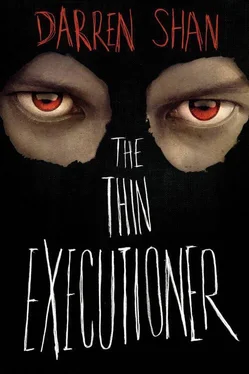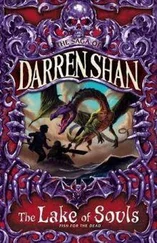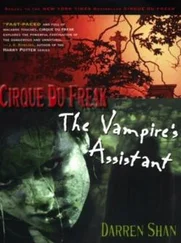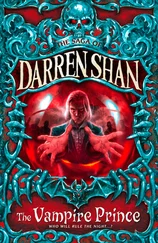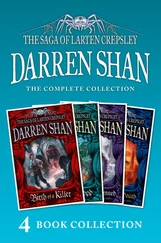“Sir!” Jebel cried, stumbling forward, raising a hand. “I fell into the river. I saw your boat and climbed aboard. I hope you don’t…”
He fell silent. The man hadn’t turned, but there was something familiar about him, the color of his robe, the straight black hair hanging down his back. Jebel felt that he knew the captain of this boat. And it wasn’t a good feeling.
“Greetings, Jebel Rum,” the man said in a low, dry voice. “I have been waiting for you.”
“Wuh-wuh-waiting?” Jebel stuttered. “I duh-don’t understand.”
“I have been busy tonight,” the man murmured. “Three in a fire. Two in a rock fall. Many killed by bats or the um Gathaah.”
“How do you know about the um Gathaah?” Jebel wheezed. “Who are you?”
The man turned slowly. He had an infant’s face, but it was made of clay, not flesh. Only the eyes and lips moved in that dreadful, eerie mask, but they belonged to no human. The eyes were those of a raven, while the lips were blue and icy, wisps of fog rising from them as he spoke.
“I am Rakhebt Wadak,” he said. And in case Jebel was in any doubt, he added emotionlessly, “The god of death.”
Jebel stood by the bow, gazing at the river. It was the as-Sudat, and yet it wasn’t. The water glowed a deep blue color, much like Rakhebt Wadak’s lips, and there was an extra layer over the raging current of the river, a gently flowing sheet. In the distance Jebel could see other boats, some like the one he was on, others radically different. All were traveling in the same direction, drifting along at the same sedate speed.
Jebel glanced at the imposing, clay-faced figure of Rakhebt Wadak. He had filled with terror when the god of death revealed his identity, but that soon passed. Jebel knew that when Rakhebt Wadak came to collect your spirit, you had to go with him. There was no point fearing death at that stage, as you were already lost to the lands of the living.
A gentle wind swept over the boat, and Jebel shivered — he was still in his wet clothes, and his hair was damp, which confused him. According to the stories, the dead went naked into the embrace of Rakhebt Wadak, who filled the holding cells below deck with their spirits. Since the rest of the details were true — the boat, the robe, the clay face, the hair — why not that part?
Jebel stepped away from the bow. Rakhebt Wadak was gazing ahead, his small, black raven’s eyes on the river. Jebel coughed to attract the god’s attention. “What are those other boats, sire?”
“Boats of death,” Rakhebt Wadak replied without looking around. “There are many people in the world, of many faiths. To satisfy them all, death must wear a variety of faces, more than you could ever imagine.”
“Are they all going to the same place?” Jebel asked.
“Yes.”
Jebel hesitated, then decided he had nothing to lose. “And where is that?”
Rakhebt Wadak’s head turned, and he gazed at Jebel. Although his face didn’t change, Jebel got the sense that the god was smiling. “We ferry the dead to the point where we offload them. Beyond that…” He shrugged.
“But I thought… I mean… you are the god of death, aren’t you?”
“I am a god of death,” Rakhebt Wadak corrected him.
“Then surely you must know where the spirits go.”
The god shook his head. “Death is not the end. It is a midway state. We ferry spirits to the beginning of the next realm, but what lies beyond this world is as much of a mystery to us as it is to you.”
“Then you don’t know what will happen to me?” Jebel asked.
“No.”
Jebel wandered around deck, feeling no different than he had when he was alive, except he was a lot colder than normal.
“Why am I so cold?” Jebel complained, wrapping his arms around himself. “If I left my body behind in the as-Sudat, why do I still feel a chill?”
Rakhebt Wadak pointed a long finger at a door in the deck near where Jebel was standing. “Look there,” he said.
There was a ring in the door. Jebel grasped it and pulled. The door swung up smoothly, and he peered into the gloom of a holding pen. There were shapes — long, stretched, thin, glowing, circling the chamber with slight swishing sounds. Some twined and twisted around one another, while more tried to keep their distance. Jebel had never seen forms like this before, but he knew instantly what they were.
“Spirits,” he sighed.
“Yes,” Rakhebt Wadak said. “The essence of the dead, parted forever from their bodies. Good and bad, old and young, powerful and weak. They all wind up here or in the bowels of a boat like this. Are they aware of what has happened to them?” His head tilted as if the question had been put to him. “I do not know. I simply ferry them from one point to the next as I always have, as I always will.”
Jebel lowered the door and frowned. “If those are spirits, and that’s where they all end up, why am I not down there with the rest of the dead?”
Rakhebt Wadak trained his beady raven’s eyes on Jebel. The Um Aineh shivered again, but this time it wasn’t from the cold. The full weight of the situation struck him. He was standing on the deck of Rakhebt Wadak’s boat, face to face with a real god ! And the god of death, no less, the most fearsome and dreaded of all. It was enough to drive a man mad, and for a few dangerous seconds Jebel teetered on the edge of insanity. But then Rakhebt Wadak spoke.
“I get lonely,” the ferryman said. “Occasionally I pluck a spirit early, before its time is up, so that we can talk.”
“ Lonely? ” Jebel echoed. “But you’re a god.”
Rakhebt Wadak sighed — the sound of a hundred corpses shifting in their graves — then pointed to another boat. “We never meet or rest. Our lives are an eternity of servitude. Do you know what it is like to be a slave?”
“Yes,” said Jebel sadly.
“Then imagine living that way for countless thousands of years. From the first moment of life we have operated, and we will continue until the last living thing passes on. Loneliness does not describe my true feelings, but it is the closest word that you have.”
“Can’t you… I don’t know… resign?” Jebel asked.
Rakhebt Wadak shook his head. “This is not a job. It is what we are. We do what we must and we can never stop. It is the way of our kind.”
A lengthy silence followed, Jebel pondering what it must be like to be in the god of death’s position, Rakhebt Wadak thinking whatever it is that immortal gods think about when they’re ferrying the spirits of the dead downriver.
“What do you want to talk about?” Jebel finally asked.
“Your life… your people… what you ate today. Anything.”
Jebel thought for a moment. “Do you know who Sabbah Eid is?”
“I have heard of him.”
“Well, this all started with the fire god. Actually, no, that’s not right, it began with my father….”
Jebel told his story, and Rakhebt Wadak listened silently, asking no questions. It was impossible to tell if he was fascinated or had heard similar tales dozens of times before.
“… The bat hit me, I lost my footing, and you know the rest,” Jebel concluded.
Rakhebt Wadak hadn’t moved while Jebel was talking. Now he raised his head, and there was the sound of him sniffing the air. “I sense the spirits of many Um Biyara. If any survived, they are few in number.”
“The fewer, the better,” Jebel growled.
Silence again. This time Jebel considered what Rakhebt Wadak had said earlier. Clearing his throat, he muttered, “Did you find my story pleasing?”
“I do not experience pleasure or displeasure,” Rakhebt Wadak said. “But it was engaging, and for that I thank you.”
Читать дальше
